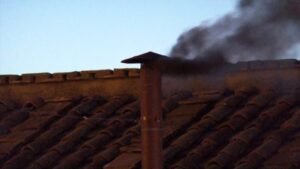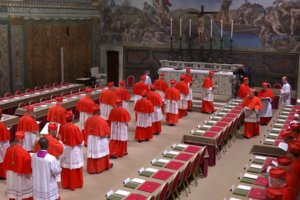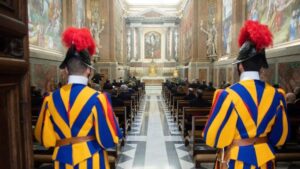VATICAN: Hours to Conclave, Cardinal Re Invokes the Holy Spirit to Guide the Election Process

Sr. Jecinter Antoinette Okoth, FSSA
Prior to the commencement of the 2025 papal conclave, Cardinal Giovanni Battista Re, Dean of the College of Cardinals, on the morning of Wednesday, May 7, invoked the power of the Holy Spirit to intercede and guide the entire voting process for the election of the successor of Pope Francis.
“We are here to invoke the help of the Holy Spirit, to implore his light and strength so that the Pope elected may be he whom the Church and humanity need at this difficult and complex turning point in history,” Cardinal Re said in his homily, addressing the 133 Cardinal Electors at St. Peter’s Basilica before they gather at the Sistine Chapel, adding, “We feel united with the entire People of God in their sense of faith, love for the Pope and confident expectation.”
Reflecting on the scriptures in the Acts of the Apostles, that after Christ’s ascension into heaven and while waiting for Pentecost, all were united and persevering in prayer together with Mary, the Mother of Jesus (cf. Acts 1:14), the Dean of the Cardinals compares the situation with what the Cardinal Electors are to do saying, “This is precisely what we are doing a few hours before the beginning of the Conclave, under the gaze of Our Lady beside the altar, in this Basilica which rises above the tomb of the Apostle Peter.”
During the morning Missa pro eligendo Romano Pontifice (Mass for electing the Roman Pontiff) as the College of Cardinals prepared to enter the 2025 conclave, His Eminence Cardinal Re emphasized the necessity of invoking the Holy Spirit in prayer. He described this act as the only appropriate approach when undertaking such a significant ecclesial responsibility. He urged the electors to set aside personal considerations, focusing solely on God’s will and the welfare of the Church and humanity.
“Let us pray, then, that the Holy Spirit, who in the last hundred years has given us a series of truly holy and great Pontiffs, will give us a new Pope according to God’s heart for the good of the Church and of humanity,” the Dean of the College of Cardinals said and continued, “Let us pray that God will grant the Church a Pope who knows how best to awaken the consciences of all and the moral and spiritual energies in today’s society, characterised by great technological progress but which tends to forget God.”
This call to prayer underscores the spiritual gravity of the conclave, reminding the Cardinal Electors that their decision transcends human deliberation and requires divine guidance. By seeking the Holy Spirit’s counsel, they aim to discern a leader who embodies the virtues necessary to shepherd the Church through contemporary challenges and to serve as a beacon of faith and unity for the global Catholic community.
During the pre-conclave Mass, the Cardinal reflected on the Gospel passage where Jesus commands, “Love one another as I have loved you,” emphasizing that this directive calls for a selfless love, extending even to the point of laying down one’s life for others. He described this as a “new” commandment, highlighting its boundless nature and the profound commitment it demands from Christ’s followers.
“The love that Jesus reveals knows no limits and must characterise the thoughts and actions of all his disciples, who must always show authentic love in their behaviour and commit themselves to building a new civilisation, what Paul VI called the “civilisation of love.” Love is the only force capable of changing the world,” He said,
The Cardinal continued, “The liturgical texts of this Eucharistic celebration, then, invite us to fraternal love, to mutual help, and commitment to ecclesial communion and universal human fraternity. Among the tasks of every successor of Peter is that of fostering communion: communion of all Christians with Christ; communion of the Bishops with the Pope; communion of the Bishops among themselves. This is not a self-referential communion, but one that is entirely directed towards communion among persons, peoples, and cultures, with a concern that the Church should always be a “home and school of communion.”
The Cardinal concluded by stressing that communion is “a strong call to maintain the unity of the Church on the path traced out by Christ to the Apostles.”
Thus, the unity of the Church is willed by Christ; “a unity that does not mean uniformity, but a firm and profound communion in diversity, provided that full fidelity to the Gospel is maintained.”


